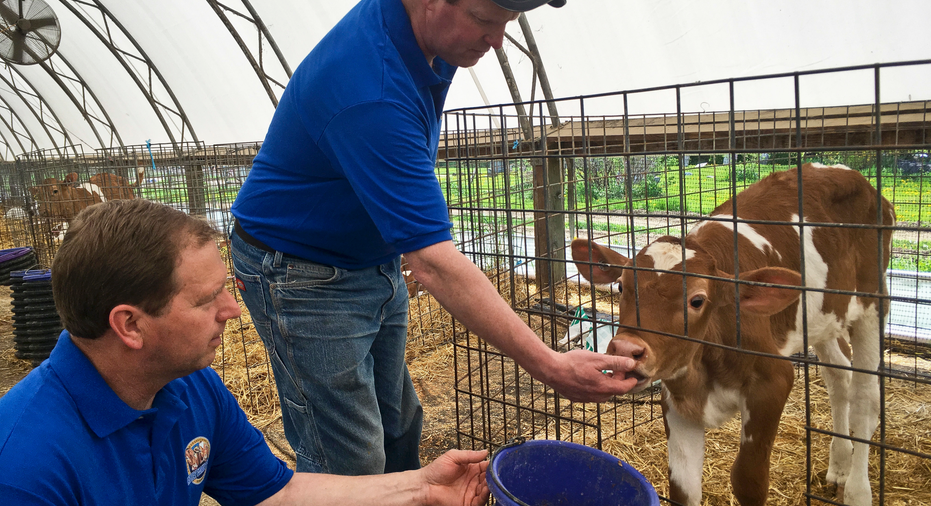Got indigestion? These cows could solve your milk problem

MORAVIA, N.Y. – Milk got your stomach feeling sour?
Dairy companies looking for ways to appeal to people who avoid milk because of indigestion are promoting what they describe as a natural, easier-drinking alternative. It's called A2 milk, which is produced by a subset of cows that produce milk lacking a protein that backers say is associated with milk's dyspeptic tendencies.
That A2 claim has its skeptics, but the bet is that consumers will pay an extra dollar or more per half-gallon to drink milk that might not cause indigestion, gas and bloating.
"Our approach has been, 'Listen, if you thought you had trouble with milk, try our A2 milk because you may be able to have it,'" said Dan Ripley, whose family farm in central New York has both ordinary cows and those producing what he sells as "Premium A2 Guernsey" milk.
The major A2 player in the United States, Australia-based a2 Milk Company, started selling its milk in California in 2015 and this year began making a big push into the Northeast. Its milk is now sold in major eastern chains such as ShopRite and Wegmans, and TV ads with the tagline "Love milk again" went up in recently New York City and elsewhere.
"The Northeast is really the big kahuna of the dairy industry in the U.S.," said Blake Waltrip, the company's U.S. CEO.
The company's U.S. expansion complements its efforts to boost distribution in markets including Southeast Asia and the Middle East under a recent deal with the world's biggest dairy exporter, New Zealand's Fonterra.
Separately, Nestle SA, the world's largest food company, began selling an A2 baby formula in China this year.
Most cows produce milk that contains both A1 and A2 proteins. Backers of this milk claim the A1 protein can cause bloating and other symptoms because of the way it breaks down when digested. Some cows naturally produce milk without the A1 protein, and farmers can breed those cows with an eye toward building a herd that produces milk that only contains the A2 protein.
This kind of milk still has lactose, but proponents say it could help people who mistakenly assume they're lactose intolerant.
In Buffalo, New York, Public Espresso + Coffee co-owner James Rayburg said he has a history of milk issues but can pour A2 on cereal or add it to recipes without worries. His shop recently switched over to Ripley's milk for all the drinks they serve.
"For me, I know if I'm feeling that much better about drinking that much milk, then our customers are feeling that way, too," Rayburg said.
Not everyone is convinced.
The National Dairy Council, which represents U.S. dairy farmers, said the claim remains an unproven theory.
Bruce German, director of the Foods for Health Institute at the University of California, Davis, said existing studies have either methodological flaws or may have issues because they are funded by the industry.
"Unfortunately, all the studies are somewhat sort of flawed in various ways, and they seem to be spinning a rather attractive story around A2," German said.
Ripley understands the skepticism and said he became convinced only after he discovered his own children could drink A2 without the digestion problems that afflicted them with regular milk.
Ripley Family Farm is essentially a competitor to Waltrip and the far larger a2 Milk Company, but both say the milk could be a boon to a U.S. dairy industry that has milk consumption dropping for decades and wholesale prices slumping amid a global oversupply.
While the vast majority of Ripley farm's revenue comes from wholesaling traditional milk, selling Guernsey A2 milk and cheese is a way to make extra income.
Other farmers who sell to the a2Milk Company, like Hourigan's Dairy Farm in central New York, get a premium for that milk from the company. While there are costs associated with segregating A2 milk and performing genetic tests to make cows produce the right type of milk, the extra money is appreciated.
"The milk market is kind of tough right now," said Hourigan's farm manager A.J. Wormouth, "and anything we can do to add value to your product definitely helps."
___
Associated Press writer Carolyn Thompson in Buffalo contributed to this report.



















